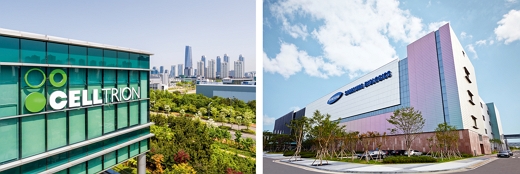A local brokerage recently released a stock market report, expecting robust growth for the country's two biopharmaceutical leaders -- Samsung Biologics and Celltrion.

Kim Hyung-soo, a Hanwha Investment & Securities analyst, stressed that his brokerage maintains a "buy" opinion for both companies. "Samsung Biologics incorporated Samsung Bioepis, a biosimilars developer, as a wholly-owned subsidiary in April," Kim said. "Accordingly, we evaluated the consolidated income statement based on the previous transaction details of the two companies."
Based on the sales and profits of Bioepis, Kim estimated that the company's second-quarter earnings would reach 623.3 billion won ($475.5 million) in sales, a 51.2 percent increase from the same period last year, and 177.1 billion won in operating profit, a 6.2 percent during the same period.
Kim noted that he expects Samsung Biologics will achieve top sales among Korean biopharmaceutical companies in 2022 with 2.56 trillion won.
"Although the utilization rate of the company's second plant has fallen due to the regular maintenance, I expect that sales of the company will expand thanks to the full operation of plants 1 and 3 and the expansion of drug product (DP) contract manufacturing organization (CMO) production volume," Kim said. "However, the increase in selling, general, and administrative (SG&A) expenses to prepare for the operation of its fourth plant will inevitably erode profitability."
Kim concluded that his brokerage maintained a "buy" opinion for Samsung Biologics' shares but that he lowered the target price from 1.22 million won to 1.2 million won.
The analyst painted a rosier picture for Celltrion, noting that the company would likely overcome the deterioration of profitability in the first quarter and see high sales growth in the second quarter.
"For Celltrion, we forecast sales of 527.9 billion won in the second quarter, a 22.3 percent increase from 2021, and operating profit of 182.5 billion won, an 11.8 percent increase from a year ago," Kim said. "We also expect diagnostic kit sales, the cause of the deteriorating profitability in the first quarter, will decline 74.3 percent from the first quarter to 31.3 billion won, leading to a drop in logistics costs."
Kim noted that the company's biosimilar sales increased by 22.7 percent, from 273.5 billion won in the first quarter to 335.7 billion won in the second, contributing to improved profitability.
Overall, Kim estimated that the company would achieve annual sales and operating profit of 2.3 trillion won and 760.6 billion won, a 20.6 and 0.5 percent increase from the previous year.
"Vegzelma, an Avastin biosimilar, is expected to receive approval in the second half, generating sales of 105 billion won this year," Kim said. "Also, as the company plans to launch Remsima SC and Yuflyma, a Humira biosimilar, in the U.S. next year, it will likely fill the sales gap caused by the Covid-19 diagnostic kits and increase profitability."
Taken together, Kim said his brokerage raised the target price of Celltrion's shares from 210,000 won to 230,000 won.

